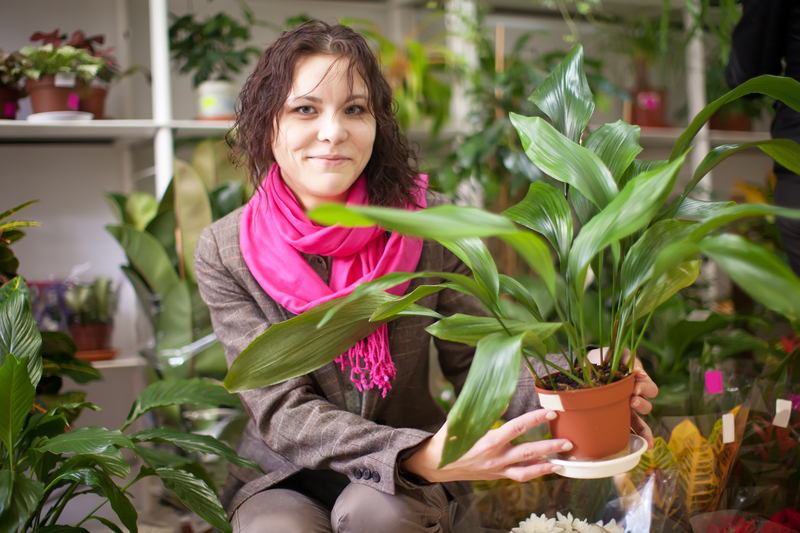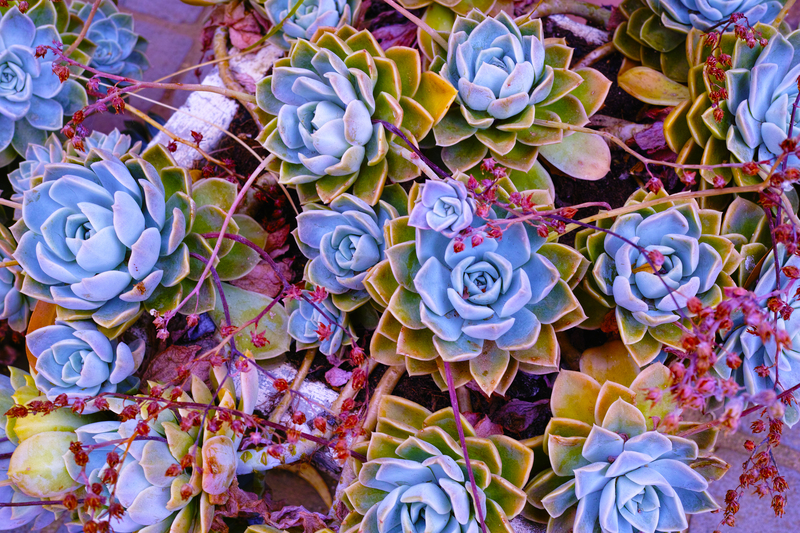Garden Simplicity: Low Budget, Low Maintenance Beauty
Posted on 03/09/2025
Garden Simplicity: Achieving Low Budget, Low Maintenance Beauty
Who says you need a lot of money and time to have a stunning garden? With a thoughtful approach, you can create a visually captivating, easy-to-care-for outdoor space. Garden simplicity is about prioritizing smart choices and embracing nature with minimal fuss.
This article explores how to design a low-budget garden that remains beautiful without demanding constant attention. Let's dive into practical tips, plant choices, and creative strategies for a low maintenance, affordable garden that thrives year-round.

Why Choose a Simple, Low Maintenance Garden?
Embracing garden simplicity doesn't mean sacrificing aesthetic appeal. Instead, it allows you to:
- Save money on tools, plants, and maintenance
- Minimize time spent watering, weeding, and pruning
- Support local pollinators and biodiversity
- Reduce resource waste like water and fertilizer
Whether you're a busy professional, first-time homeowner, or simply seeking a more sustainable lifestyle, a low maintenance backyard or front garden can give you peace of mind, beauty, and extra free time.
Key Principles of a Simple, Budget-Friendly Garden
Let's outline the core principles behind a low budget low maintenance garden:
1. Plan with Purpose
Effective garden simplicity starts with a solid plan. Assess your space, sunlight, and soil type. Map out areas for relaxation, play, or growing food as suits your needs. A clear plan prevents costly mistakes and ensures everything has its place.
2. Choose the Right Plants
The foundation of a low-effort, low-cost garden is plant selection. Opt for:
- Native species: Local plants are adapted to your climate and need little extra care
- Perennials: They return year after year, saving you the cost of replanting
- Drought-tolerant varieties: Cut down on water and worry in dry seasons
Selecting the right plants is the most effective way to reduce both labor and cost.
3. Minimize Lawn Area
Lawns can be labor-intensive, requiring frequent mowing, watering, and fertilizing. Replace lawn sections with:
- Gravel, mulch, or stone pathways
- Wildflower meadows for a natural look
- Ground covers like creeping thyme or clover
4. Use Mulch Generously
Layering mulch helps in multiple ways:
- Suppresses weeds (less pulling!)
- Conserves soil moisture
- Regulates soil temperature
5. Embrace Functional Simplicity
Garden simplicity is enhanced by incorporating multi-use elements:
- Raised beds for veggies or herbs are easier to maintain
- Vertical trellises for climbing plants save space and labor
- Rain barrels for watering reduce water bills
Designing Your Low-Maintenance, Low-Cost Garden
With principles in mind, let's explore practical design steps for a beautiful, low-maintenance, budget garden.
Step 1: Sketch Your Space
Start with a rough drawing. Note sunlight patterns, existing trees, slopes, and desired features. Planning ahead keeps your spending--and maintenance--under control.
Step 2: Decide on Structure
Consider adding clear, simple structure:
- Narrow stone paths to minimize wear and maximize access
- Defined garden beds edged with bricks, logs, or upcycled materials for clear boundaries and easier weeding
- One or two seating areas using reused garden benches or chairs
Step 3: Group Plants by Need
Reduce maintenance by placing plants with similar water and sunlight requirements together. This approach makes watering simpler and helps ensure all your greenery thrives with minimal intervention.
Step 4: Opt for Easy-Care Features
- Low-cost solar lighting for evening ambiance
- A small birdbath or feeder crafted from repurposed items
- Decorative stones, driftwood, or shells for interest without upkeep
Top Plant Choices for Simple, Low Budget Gardens
Plant selection is your secret weapon for low maintenance, affordable gardening. Here's a list of trusted, easy-care options that thrive in many climates:
Perennials
- Daylilies (Hemerocallis)
- Hostas
- Black-eyed Susan (Rudbeckia)
- Lavender
- Salvia
Ground Covers
- Creeping thyme
- Sedum
- Ajuga
- Vinca minor (periwinkle)
Drought-Tolerant Native Plants
- Yarrow
- Blanket flower (Gaillardia)
- Purple coneflower (Echinacea purpurea)
- Shasta Daisy
Shrubs & Trees for Structure
- Boxwood (requires little shaping)
- Dogwood
- Hydrangea (dwarf varieties for small spaces)
- Serviceberry
Check your local gardening center or native plant society for the best regional choices.
Budget-Friendly Garden Enhancements
Garden simplicity doesn't mean blandness. Simple, clever enhancements add charm and functionality without raising costs or maintenance. Try these ideas:
DIY Pathways and Edging
- Lay gravel, wood chips, or repurposed bricks for easy paths
- Use stones, logs, or recycled plastic edging to separate beds and turf
Benefits: Paths and borders define the space and reduce weed encroachment.
Upcycled Containers
- Old buckets, watering cans, or wooden crates as planters
- Painted tire planters for a pop of color and upcycling solution
- Bamboo or pallet vertical planters for small spaces
Rainwater Collection
- Install a rain barrel under a downspout for watering gardens at no extra cost
- Use collected water for hand-watering new plants or containers
Compost for Free Fertilizer
- Set up a simple compost bin with kitchen scraps and yard clippings
- Spread compost each spring to enrich your soil naturally
Composting reduces waste, saves money, and improves soil--a key to simple gardening.
Essential Low Effort Maintenance Tips
Your simple, low maintenance garden needs only the basics once established:
- Mulch annually to suppress weeds
- Prune shrubs and perennials lightly in the right season
- Group waterings to once or twice per week--deep and infrequent is best
- Monitor for pests and disease and remove affected material promptly
Remember: The right plant, in the right place, means less work for you!
Garden Simplicity for Small Spaces
You don't need a large yard to enjoy low maintenance garden beauty on a budget. Balconies, courtyards, and patios can all benefit from these simple strategies:
- Vertical gardens with climbing plants or pocket planters
- Self-watering or large shared pots to reduce watering frequency
- Mix ornamental grasses, succulents, and perennial flowers for multi-season interest
Tip:
Stick to a unified color palette for a curated feel, even with limited space and spending.

FAQs: Simple, Low Budget and Low Maintenance Gardening
What is the cheapest way to start a low maintenance garden?
The cheapest route is to start small, propagate your own plants or swap with neighbors, use seeds instead of starter plants, and repurpose materials for beds, paths, and containers.
How can I make my garden look good all year without much work?
Mix evergreen shrubs, perennial grasses, and flowering perennials. Drought-tolerant evergreens and mulched beds look neat through all seasons.
Can I have a no-mow lawn or alternative?
Yes, consider clover, creeping thyme, or wildflower meadows instead of traditional turf grass for less mowing and watering.
Are synthetic lawns a good low maintenance option?
Artificial turf requires little care but can be expensive upfront, and it doesn't support local wildlife. Natural ground covers or alternative grasses are more eco-friendly.
Conclusion: Garden Simplicity is Within Reach
With smart choices and creative thinking, anyone can cultivate an attractive, budget-friendly, and effortless garden. Focus on:
- Native, low maintenance plants
- Simple structures and reused materials
- Smart watering and mulching strategies
- Sustainable gardening techniques
Whether you have a sprawling yard or a compact balcony, garden simplicity offers beauty and serenity without the burden of expense or excessive labor. Start small, plan wisely, and let nature do the hard work!
Looking for more inspiration?
Explore local gardening groups, online forums, and native plant societies for advice tailored to your region. Soon enough, your low budget, low maintenance garden sanctuary will be the talk of the neighborhood--with less sweat and less spending.
Latest Posts
Creating Engaging Outdoor Spaces for Young Children
Boost Your Gardening Game with These Top Tools
Essential Tips for Healthier Orchids

